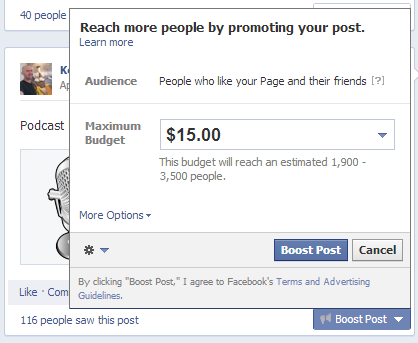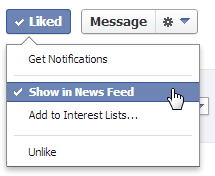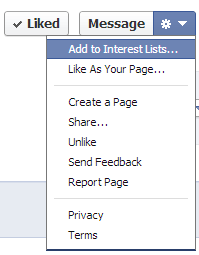I have seen many internet marketers dismiss Facebook as a source of traffic. This may be partly due to some internet users growing bored of Facebook, however the fact remains that most people who use the internet also have a Facebook account. Currently, Facebook has over 1.1 billion users, therefore the potential reach that Facebook has for you is huge.
There is another reason why some website owners have stopped being active on Facebook. Last year, Facebook substantially reduced the reach of Facebook pages. At the time I had three or four Facebook pages that were sending me 1,000 to 2,000 visits to my websites per day, and over the course of a few months this was reduced to around 100 to 200 visits per day. As you can imagine, the income generated through those particular websites suffered greatly because of it.
Facebook Page Reach Changes
The changes that Facebook made in 2012 affected everyone who promoted their website through Facebook. Different people reported different drops in traffic though it was clear that everyone had seen their traffic from Facebook reduce.
Benny Luo from New Media Rockstars wrote an article in October 2012 that noted that Facebook’s new algorithm had slashed Facebook page reach by 40%.
Facebook responded to their claims with this statement:
We’re continuing to optimize News feed to show the posts that people are most likely to engage with, ensuring they see the most interesting stories. This aligns with our vision that all content should be as engaging as the posts you see from friends and family.
Whichever Facebook employee made the above statement should become a politician. It admirably answers the question about Facebook page reach dropping without actually saying it. This ambiguous response was close to an admission from Facebook that their ranking system had indeed changed, however a few people disagreed.
Josh Constine wrote an article on TechCrunch that countered the claim about Facebook page reach decreasing, and said that Facebook didn’t decrease page feed reach at all. It’s worth noting that this article was published in November 2012; around three weeks after the article that Benny Luo published.
Josh noted:
So why is this untrue? Let’s start by debunking some major flaws in the logic of Dangerous Minds. First, it implies that Facebook Pages previously reached 100 percent of their fans with every post. That’s never been true. Facebook’s news feed ranking algorithm (widely known as EdgeRank) chooses between hundreds or thousands of pieces of content each day to show the few dozen most relevant stories in each person’s news feed.
Facebook told me in February that the average Page reaches 16 percent of its fans with each post. That’s because some fans aren’t online when the post is published, a specific post hasn’t gotten much engagement from the people Facebook already showed it to, and because if you don’t interact with that Page when you do see its posts, Facebook will only show you them every once in awhile.
You don’t reach all your followers on Twitter with each tweet either. You could, except most people follow so many people that they only read parts of their stream. If Facebook did show all Pages posts in everyone’s news feed, it would be horrible. The feed would be full of lame marketing messages that would drown out your friends.
The above does make sense. It is impossible for any post on Facebook to be seen by your whole audience as not everyone is going to be online. The sheer nature of social media websites means that users will only see items when they log in. I cannot say whether a year ago the average Facebook page reached 16 percent of its fans with every post. What I do know is that Facebook traffic for every single one of my websites dropped considerably. If page reach was always at around 16%, then no one would have seen a drop in traffic, which is not what website owners saw.
Look at the screenshot below from Google Analytics for one of my Facebook pages. I don’t want to go into specifics, but pay attention to how traffic at the end of the year was around 10% of what it was in May and June 2012.

One thing to bear in mind is that although my traffic from Facebook was only 10% of what it was by the end of the year, the number of fans for each of my pages was two to three times higher. Yes that’s right, I managed to double or treble the number of fans that each fan page had and traffic was still only 10% of what it was previously. This suggests that traffic had dropped in real terms to only 4% to 5% of what it was previously.
The article also stated that many changes were introduced to combat spam. Facebook apparently updated their “EdgeRank” ranking system to punish pages which were spammy. I do not believe my fan pages could be classified as that though I do know that even when I only updated once a day or once every few days, the traffic I received from Facebook was terrible.
Will Cathcart, Facebook’s product manager for news feed, spoke to Josh Constine from TechCrunch regarding the issue. He said:
We made a relatively large ranking change in September that was designed to reduce spam complaints from users. We used [spam] reports at an aggregate level to find Pages or apps generating a lot of reports [and decrease their reach]. We’ve also added personalized attempts to reduce presence of posts you’re likely to complain about.
You have probably seen the report spam option that Will Cathcart is referring to. It can be selected on any entry on Facebook; whether it be from friends or a Facebook page.

I understand the need for Facebook users to be able to report entries (for racism etc.). It seems a little strange to me that someone can report a friend or a Facebook page as spam. After all, they chose to like them in the first place, therefore if they do not like the content from anyone, all they have to do is click the unlike button.
It just seems bizarre that anyone would like a page and then report it as spam, as they made the decision to receive content from them. It is also concerning that these spam reports are used against the page to decrease their reach. As a result, traffic drops and revenue drops with it.
This spam reporting feature raises some questions for me:
- Is every single spam report reported thoroughly? – I seriously doubt that Facebook investigates every single spam report thoroughly. Doing so would require a huge amount of manpower, therefore I imagine their software must analyse the page and check posting frequency, whether a link was attached etc.
- Can competitors do this to harm your business? – Anyone can report any page on Facebook. This means there is nothing to stop a competitor liking your page and then reporting it for spam. One person may not make a difference but what if they asked friends to do it too or paid people to report your page as spam. Would Facebook realise that this was an attack and would they even care?
- Can the reach of a page return to its normal level? – How long does a spam report effect the reach of a page? I imagine that any penalty would decrease over time.
The biggest thing that pissed me off about all those changes is that Facebook never once advised me of them. Not once. They had sent me countless emails encouraging me to build up my Facebook pages by advertising through them, yet they did not send me one email to tell me that the reach of Facebook pages had been greatly reduced.
If you are thinking that I am pissed off about the issue, you would be correct. I spent thousands of dollars on Facebook promoting my pages to new fans, which is what Facebook encouraged me and other website owners to do. They then changed their algorithm so that our posts would not be seen by many people. Having a Facebook page with many fans can still be beneficial though the changes in 2012 completely changed the landscape for bloggers like myself that want to reach people through their service.
The Introduction of Promoted Posts
The timing of all Facebook’s algorithm changes came when they introduced a new feature called promoted posts. It did not take long for people to put two and two together. Shortly after the announcement of the new feature, Ars Technica posed the question “Is Facebook “broken on purpose” to sell promoted posts?“.
It was a legitimate question. Facebook reduced the traffic they were sending to websites by up to 95% in some cases. All of their official statements regarding the issues meant nothing. Facts were facts: Facebook reduced the reach of all pages and directly afterwards they tried to sell us that paying money to them to reach all of your fans was a good thing.
Let’s take a minute to compare the social media model that Facebook uses against Google+ and Twitter:
- Twitter – Someone who follows you sees every single message you send.
- Google+ – Someone who follows you sees every single message you send.
- Facebook – Someone who follows you sees 5% to 10% of your messages.
When you see the whole thing described the way it is above, it really hits home about what Facebook are doing. They are essentially stopping messages from being shown to people who asked to view those messages.

There is no doubt that all of the changes from Facebook have occurred because of what happened on 18 May 2012. If you cast your mind back to one year ago, you will recall that Facebook was in the news every day because of its initial public offering (IPO). The news stories focused on two things: the people who would become instant millionaires and how Facebook was going to become more profitable.
Facebook may claim that the changes they made in 2012 was for the benefit of users, however the main reason was that they had to generate more money. They had to prove to investors that Facebook could give them a good return if they invested in them….but how could Facebook get advertisers to spend more money through them if they were getting so much traffic for free? The answer was simple:
- Remove that free traffic.
- Offer advertisers a way to get that traffic back.
Due to the changes that Facebook introduced, I lost a lot of money. Many of the websites that I promoted through Facebook were monetized using Google Adsense (amongst other things). My Adsense income dropped from over £1,000 per month to just over £100 in just a matter of months. I appreciate that it was wrong to put all of your eggs in one basket (especially someone else’s basket!), however let’s put things into perspective. I was not gaming a system of any kind. I had just been screwed by a company that had encouraged me to advertise through them. My income from Google Adsense would have been at least £10,000 over the last 12 months if the changes were not made.
As I noted previously in this article, many people were affected by the changes from Facebook…and like me, many people were a little bitter about it. Richard Metzger from Dangerous Minds wrote a fantastic article on the issue back in October 2012 entitled “Facebook: I Want My Friends Back” (it has been shared over 163,000 times on Facebook so far!).
He headlined his post with the message “The Biggest ‘Bait N’ Switch’ in History”. It is a good way to describe the situation which arose. Facebook was like a drug dealer getting us all hooked on their heroin-soaked free traffic and then took it all away and told us to pay for it.
Richard Metzger also noticed that his traffic was dropping and dropping from Facebook, despite the number of likes to his website going up and up. He shared a few interesting comments from other website owners, that I encourage you to read to get an understanding of how badly these changes affected everyone:
I run a Facebook page with 15,000 fans. That’s 15,000 people who have consciously signed up for our website updates and want it to appear in their newsfeed. Yet, we’re having exactly the same problem this article chronicles. We’re barely reaching 15-20% of our fan page and we’re sharing stuff that always used to be popular. Facebook for us was always a vehicle to drive traffic to our website (just like our email list, twitter page, etc). It’s become less and less valuable as a tool to do this due to Edgerank and Facebook wanting to charge you to reach the audience you’ve ALREADY paid to reach. It’s a betrayal. It’s just not worth it to pay $100 to reach all of our fans for one article. As a small business, I’m starting to care less and less about Facebook and I’m not alone. They need to get rid of Edgerank and get rid of Sponsored Posts.
In response, a man named Bill Downey said:
I have a similar experience, my page has over 40,000 fans and when Facebook started this the traffic to my website dropped from 30,000 a day to 5,000 a day. I tried paying for extra reach but it’s not worth it for a small site like mine. The fee they charge I can not make up thru ad revenue. It’s probably fine for McDonalds page or Coke who can afford $200 per post for the full reach. I would be all for paying if the cost to play wasn’t so steep, they need to come up with better scaling for the fees for smaller pages. They don’t care about the little guys when they can sock it to the big companies. The worst part of it though is the lying to our fans that sign up to see our content and then never do unless they fall in that 15% group. Facebook has a number of other issues that make most of its users hate it. I know I despise it and I am desperately trying to find a way to replace it for promotion.
Richard Metzger raised the issue as whether we should be promoting our websites through Facebook at all. He may be right. In the past I have always offered many different ways to blog readers to follow me, though people will choose one over another. If someone subscribes to your RSS feed, they may not follow you on Twitter. If they subscribe to you on Facebook, they might not follow you via Google+. The majority of readers will follow you using one method, however by offering them the option of following you through Facebook, you may only reach them 10% of the time.
Personally, as a publisher of a medium readership blog, I used to get a great deal from using Facebook—but I understood it to be a two-way reciprocal arrangement because I was driving traffic back to Facebook as well, and reinforcing their brand awareness with prominent widgets on our blog—but like Bill and Jonathan here, we’re actively seeking out other ways of driving traffic to the site now. With this very post—which will likely be the first and very last thing we’ll ever pay to promote on Facebook—we’re hoping to increase sign-ups to our daily newsletter (sign up at the top of this page), our Twitter feed and our Google+ page.
I can sympathize with Facebook’s travails on the stock market and I can appreciate that they are providing a value—a great one, unprecedented, really—by connecting such a vast number of human beings in an electronic global village. But I can’t pay them $2000 a day and $672,000 a year for the exact same product that I was getting for free back in March!
I encourage you to also read Richard’s follow up article “Pay Facebook to Promote This Post or This Dog Will Die!“.
The complaints regarding Facebook’s changes have died down since late last year though I am sure many website owners still feel aggrieved about the issue. Facebook did bring in some changes to help a page increase their EdgeRank and be seen more on their followers Facebook wall.
Keeping Facebook Fans Informed of New Posts
In late 2012 Facebook also introduced a change where users had to opt-in to be notified of new posts from a fan page. Liking a page was no longer enough. A user also had to place a fan page within an interest list to ensure that your posts are displayed.

Their changes could be viewed as a reflection of the downsides of using Facebook. Facebook has made it too easy for people to like pages, but by doing so they are increasing the odds of information overload. Should website owners be the ones who pay for this? Isn’t someone liking your page enough to advise Facebook that you want to see all of their posts? Twitter and Google+ don’t ask you to opt-in to get updates after you have followed someone. Liking a page is opting-in.
On the plus side, people who love your fan page can click on the like button and choose to be notified of every one of your posts. This ensures that they will always get updated.

If you have a Facebook fan page, it pays to post a message every so often that reminds users to take the above steps to view all of your posts.
Moving Forward with Facebook
At the start of this article I stressed that Facebook has the potential for you to connect to a huge audience. I still believe that this is the case. Unfortunately, it will not bring you the kind of traffic you would have received one year ago unless you pay for the privilege.
Writing this article reminded me how pissed off I was about the issue last year. Some people commented that website owners like me should not complain as Facebook was free. The thing is, it wasn’t. Facebook was not free. Myself, and hundreds of thousands of other website owners and business owners, had paid to promote our pages to users. Therefore, the changes they implemented hurt our bottom line.
Truth be told, I have moved on. I try not to dwell on issues like this too long. Moving forward, I still have several websites which have corresponding Facebook pages of between 10,000 and 50,000 followers. Even with the changes in Facebook’s algorithm, that kind of following can be used to drive traffic to my websites.
The other week I decided to try out Facebook’s post promotion for myself. The results were interesting. If you would like to find out how I got on, make sure you check back here tomorrow*, as I will be walking you through exactly what I did and showing you the traffic I received as a result of the promotion. Those of you who have ever wondered about how you can get traffic through Facebook should make a point of reading it.
I appreciate you taking the time to read this post. As always, I love hearing from my readers, therefore I would love it if you would take the time to share your view on this issue in the comment area (particularly those who were affected by last year’s algorithm changes on Facebook).
Thanks,
Kevin
* UPDATE – The follow up to this article can be seen here: “Everything You Need to Know About Promoting Posts on Facebook” :)

